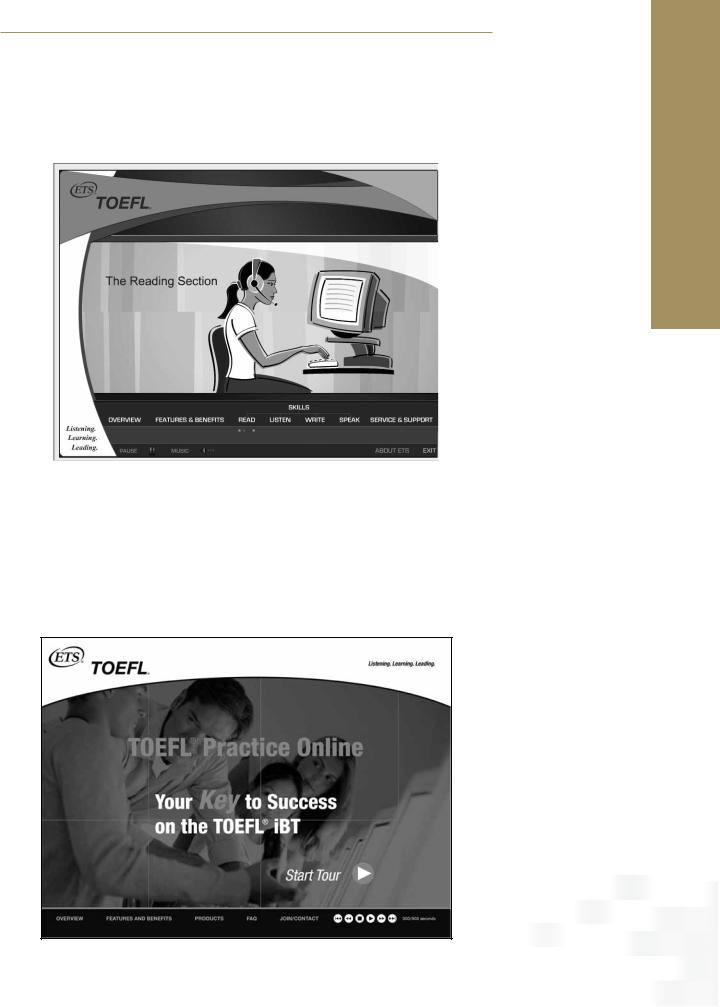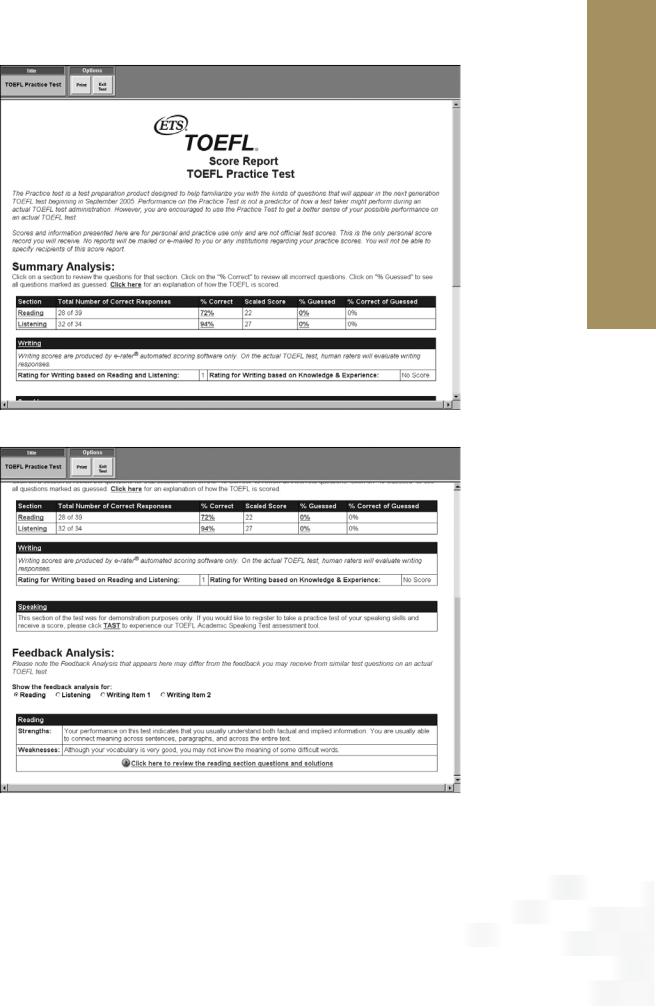
TOEFL_Tips
.pdf
General Skill-Building Tips
The best way for English-language learners to develop the skills measured by the TOEFL iBT is to enroll in an English-language learning program that provides instruction in:
●● reading, speaking, listening, and writing skills, with an emphasis on speaking
●● integrated skills approach (e..g.., instruction that builds skills in listening/ reading/speaking, listening/reading/writing)
In addition to the advice for improvement listed on pages 56 to 69, ETS has created the following tips for students, but they also contain information useful to teachers..
A. Reading Tips
English-language learners can improve their reading skills by reading regularly, especially university textbooks or other materials that cover a variety of subject areas (e..g.., sciences, social sciences, arts, business, etc..) and are written in an academic style.. A wide variety of academic texts are available on the Internet as well as in magazines and journals..
Reading to Find Information
●● Scan passages to find and highlight key facts (dates, numbers, terms) and information..
●● Practice frequently to increase reading rate and fluency..
Reading for Basic Comprehension
●● Increase vocabulary.. Flashcards can help..
●● Practice skimming a passage quickly to get a general impression of the main idea, instead of carefully reading each word and each sentence..
●● Develop the ability to skim quickly and identify major points..
●● After skimming a passage, read it again more carefully and write down the main idea, major points, and important facts..
●● Choose some unfamiliar words in the passage and guess the meaning from the context (surrounding sentences).. Then, look them up to determine their meaning..
●● Underline all pronouns (e..g.., he, him, they, them, etc..) and identify the nouns to which they refer in the passage..
●● Practice making inferences and drawing conclusions based on what is implied in the passage as a whole..
Practice your reading skills
with TOEFL® Practice Online at www.ets.org/toeflpractice and receive instant scores to confirm you are ready for test day.
Tips Building-Skill General
Notes
The Reading section does not measure summarizing skills, but practicing them builds the skills required for the integrated tasks in the Speaking and Writing sections.
General Skill-building Tips |
29 |

Notes
The Reading section measures the ability to recognize paraphrases. The ability to paraphrase is also important for the integrated tasks in the Writing and Speaking sections of the test.
The Listening section does not measure summarizing skills, but practicing summarizing skills is useful for the integrated tasks in the Speaking and Writing sections.
Reading to Learn
●● Identify the passage type (e..g.., classification, cause/effect, compare/ contrast, problem/solution, description, narration, etc..) and its organization..
●● Organize the information in the passage:
–Create an outline of the passage to distinguish between major and minor points..
–If the passage categorizes information, create a chart and place the information in appropriate categories..
On the TOEFL iBT, test takers do not have to create such a chart. Instead, a chart with possible answer choices is provided for them, and they are required to fill in the chart with the correct choices. Practicing this skill will help test takers think about categorizing information, and be able to do so with ease.
●● Create an oral or written summary of the passage using the charts and outlines..
●● Paraphrase individual sentences in a passage.. Then, paraphrase entire paragraphs..
B. Listening Tips
Listening to the English language frequently and reading a wide variety of academic materials is the best way to improve listening skills..
Watching movies and television, and listening to the radio provide excellent opportunities to build listening skills.. Audiotapes and CDs of lectures and presentations are equally valuable and are available at libraries and bookstores.. Those with transcripts are particularly helpful.. The Internet is also a great resource for listening material (e..g.., www.npr.org or www.bbc.co.uk/radio or www.bbc.co.uk/worldservice/learningenglish)..
Listening for Basic Comprehension
●● Increase vocabulary..
●● Focus on the content and flow of spoken material.. Do not be distracted by the speaker’s style and delivery..
●● Anticipate what a person is going to say as a way to stay focused..
●● Stay active by asking yourself questions (e..g.., What main idea is the professor communicating?)..
●● Copy the words, “main idea, major points, and important details” on different lines of paper.. Listen carefully, and write these down while listening.. Continue listening until all important points and details are written down and then review them..
●● Listen to a portion of a lecture or talk and create an outline of important points.. Use the outline to write a brief summary.. Gradually increase the amount of the presentation you use to write the summary..
30 TOEFL iBT Tips

Listening for Pragmatic Understanding10
●● Think about what each speaker hopes to accomplish: What is the purpose of the speech or conversation? Is the speaker apologizing, complaining, or making suggestions?
●● Notice each speaker’s style.. Is the language formal or casual? How certain does each speaker sound? Is the speaker’s voice calm or emotional? What does the speaker’s tone of voice tell you?
●● Notice the speaker’s degree of certainty.. How sure is the speaker about the information? Does the speaker’s tone of voice indicate something about his/her degree of certainty?
●● Listen for changes in topic or digressions11..
●● Watch a recorded TV or movie comedy.. Pay careful attention to the way stress and intonation patterns are used to convey meaning..
Listening to Connect and Synthesize12 Ideas
●● Think about how the lecture you’re hearing is organized.. Listen for the signal words that indicate the introduction, major steps or ideas, examples, and the conclusion or summary..
●● Identify the relationships between ideas.. Possible relationships include: cause/effect, compare/contrast, and steps in a process..
●● Listen for words that show connections and relationships between ideas..
●● Listen to recorded material and stop the recording at various points.. Predict what information or idea will be expressed next..
●● Create an outline of the information discussed while listening or after listening..
Practice your listening skills
with TOEFL® Practice Online at www.ets.org/toeflpractice and receive instant scores to confirm you are ready for test day.
C. Speaking Tips
The best way to practice speaking is with native speakers of English.. If you do not live in an English-speaking country, finding native speakers of English might be quite challenging.. In some countries, there are English-speaking tutors or assistants who help students with conversation skills and overall communication skills.. It is critical to find them and speak with them as often as possible.. Another way to practice speaking is by joining an English club whose members converse in English about movies, music, and travel.. If a club does not exist in your area, start one and invite native speakers to help you get started..
Independent Speaking Tasks
●● Make a list of topics that are familiar, and practice speaking about them.. ●● Describe a familiar place or recount a personal experience..
●● Later, state an opinion or a preference and present clear, detailed reasons for it.. ●● Make a recommendation and explain why it is the best way to proceed..
●● Practice giving one-minute responses to topics..
10Pragmatic understanding—To understand a speaker’s purpose, attitude, degree of certainty, etc..
11Digressions—Side comments in which the speaker briefly moves away from the main topic and then returns
12Synthesize—To combine information from two or more sources
Tips Building-Skill General
General Skill-building Tips |
31 |

Integrated Speaking Tasks
●● Find a textbook that includes questions about the material at the end of chapters, and practice answering the questions orally..
●● Read a short article (100–200 words).. Make an outline that includes only the major points of the article.. Use the outline to orally summarize the information..
●● Find listening and reading material on the same topic covered by the article.. The material can contain similar or different views.. (The Internet and the library are good places to find information..) Take notes or create outlines on the listening and reading material:13
–Orally summarize the information in both the written and spoken materials.. Be sure to paraphrase using different words and grammatical structures..
–Orally synthesize the material by combining the information from the reading and listening materials and explain how they relate..
–State an opinion about the ideas and information presented in the reading and listening material and explain how they relate..
–If the reading and/or listening material describes a problem, suggest and explain a solution to the problem..
●● Recognize the attitude of the speaker or the writer of the original material through intonation, stress, and word choice.. This helps to understand their point of view and plan an appropriate response..
All Speaking Tasks
●● Increase vocabulary and learn to use idiomatic speech appropriately.. ●● Learn grammatical structures and use them naturally when speaking..
●● Work on pronunciation, including word stress, intonation patterns, and pauses.. (There are a number of products and websites that can help you develop pronunciation skills..)
●● When practicing for the TOEFL iBT using the tips above, take 15 seconds to think about what you’re going to say before you speak.. Write down a few key words and ideas, but do not attempt to write down exactly what you are going to say.. (Raters will be able to detect responses that are read and give them a lower rating..)
●● Use signal words and expressions to introduce new information or ideas, to connect ideas, and to mark important words or ideas.. This will help the listener easily follow what you are saying.. (For example, “on the one hand…,” “but on the other hand…,” “what that means is…,” “The first reason is…,” “another difference is…”)
●● Make recordings of the above activities and evaluate your effort by asking yourself these questions:
–Did I complete the task?
–Did I speak clearly?
–Did I make grammatical errors?
–Did I use words correctly?
–Did I organize my ideas clearly and appropriately?
–Did I use the time effectively?
–Did I speak too fast or too slowly?
–Did I pause too often?
13Taking notes on the reading and listening material in the integrated Speaking tasks on the TOEFL iBT test is allowed.. Since the reading and listening material is very brief, taking notes on the material may not be necessary.. However, the activity described above will help test takers prepare for entering the academic setting.. If test takers can do this well, they will most likely succeed on the integrated Speaking tasks on the TOEFL iBT test..
32 TOEFL iBT Tips

●● Monitor your progress and ask an English teacher or tutor to evaluate your speech using the appropriate TOEFL iBT Speaking Rubrics.. (See pages 44 and 45 for the Rubrics..)
Practice your speaking skills
with TOEFL® Practice Online at www.ets.org/toeflpractice and receive instant scores to confirm you are ready for test day.
To practice your pronunciation skills use Pronunciation in English at www.ets.org/tse/pie22.html.
D. Writing Tips
Integrated Writing Tasks
●● Find a textbook that includes questions about the material at the end of chapters and practice writing answers to the questions..
●● Read an article that is about 300–400 words long.. Make an outline that includes the major points and important details of the article.. Use the outline to write a summary of the information and ideas.. Summaries should be brief and clearly communicate only the major points and important details.. Be sure to paraphrase using different words and grammatical structures..
●● Find listening and reading material on a single topic on the Internet or in the library.. The material can provide similar or different views.. Take notes on the written and spoken portions, and do the following:
–Summarize the information and ideas in both the written and spoken portions..
–Synthesize the information and discuss how the reading and listening materials relate.. Explain how the ideas expressed are similar, how one idea expands upon another, or how the ideas are different or contradict each other..
Paraphrasing
Paraphrasing involves restating something from the source material in one’s own words.. On the TOEFL iBT, test takers receive a score of zero if all they do is copy words from the reading passage.. Practice paraphrasing words, phrases, sentences, and entire paragraphs frequently using the following tips:
●● Learn to find synonyms with ease.. Pick 10 to 15 words or phrases in a reading passage and quickly think of synonyms without looking them up in a dictionary or thesaurus..
●● Write a paraphrase of a reading passage using only your notes.. If you haven’t taken notes, write the paraphrase without looking at the original text.. Then check the paraphrase with the original passage to make sure that it is factually accurate and that you have used different words and grammatical structures..
Independent Writing Tasks
●● Make a list of familiar topics and practice writing about them..
●● For each topic state an opinion or a preference and then support it with evidence..
●● Practice planning and writing at least one essay for each topic.. Be sure to take 30 minutes to plan, write, and revise each essay..
●● Think about and list all ideas related to a topic or task before writing.. This is also called “prewriting..”
Tips Building-Skill General
General Skill-building Tips |
33 |

Notes
Teachers: It is a good idea for English programs to use the TOEFL Speaking and Writing Rubrics (pages 44–47) to measure students’ abilities and evaluate their progress. This helps students build their skills for the TOEFL iBT.
●● Identify one main idea and some major points to support that idea, and plan how to communicate them (by creating, for example, an outline to organize ideas)..
●● Create a focused thesis statement and use it to develop the ideas presented in the essay..
●● Develop the essay by using appropriate explanation and detail..
All Writing Tasks
●● Increase vocabulary and knowledge of idiomatic speech so you can use it appropriately..
●● Learn grammatical structures so well that you can use them naturally when writing..
●● Learn the conventions of spelling, punctuation, and layout (e..g.., paragraph creation)..
●● Express information in an organized manner, displaying unity of thought and coherence..
●● Use signal words and phrases, such as “on the one hand” or “in conclusion,” to create a clear structure for your response..
●● As you practice ask yourself these questions:
–Did I complete the task?
–Did I write clearly?
–Did I make grammatical errors?
–Did I use words correctly?
–Did I organize my ideas clearly and coherently?
–Did I use the time effectively?
●● Monitor your own progress and ask an English teacher or tutor to evaluate the writing by using the appropriate TOEFL iBT Writing Rubrics.. (See pages 46–47 for the Rubrics..)
Practice your writing skills
with TOEFL® Practice Online at www.ets.org/toeflpractice and receive instant scores to confirm you are ready for test day.
If you want more writing practice, ask your teacher about ETS Criterion Online Writing Evaluation Service or visit www.ets.org/criterion.
34 TOEFL iBT Tips

Test Preparation Tips
Step 1: View all the Test Materials to See What the Test is Like.
●● Use the TOEFL iBT online tour at www.ets.org/toefl to become familiar with specific parts of the test or view a complete sample test within the TOEFL Practice Online site at www.ets.org/toeflpractice..
This is a screen from the online tour..
●● Become familiar with the Speaking and Writing Rubrics on pages 44–47 and how responses are evaluated..
●● Register for the TOEFL iBT and receive a FREE TOEFL iBT Sampler to become familiar with the test format and question types.. Take a practice test on TOEFL Practice Online.. Individuals that join TOEFL Practice Online also receive free membership to the TOEFL® access online community, which provides information about studying in Englishspeaking countries..
Tips Preparation Test
Test Preparation Tips |
35 |

Step 2: Take an Online Practice Test on TOEFL Practice Online— www.ets.org/toeflpractice. It’s the key to success on the TOEFL iBT.
Do your best on the TOEFL iBT by practicing with exclusive test materials from ETS.. TOEFL Practice Online offers:
●● A real TOEFL iBT test experience
●● Practice tests that help prepare you for test day
●● INSTANT scores and performance feedback on all four skills ●● A variety of targeted practice
●● Access to discussion boards
●● The TOEFL access online student community that provides information on studying in English-speaking countries
TOEFL Practice Online members have the option of taking the practice test under timed or untimed conditions so they can get used to the pace of the test, using headphones, and the directions they’ll receive while taking the official test..
36 TOEFL iBT Tips

●● Score reports include both skill scores and performance feedback so test takers understand their strengths and weaknesses.. (Note: These are different from the official TOEFL iBT score reports..)
Tips Preparation Test
Test Preparation Tips |
37 |

You can supplement your practice by purchasing The Official Guide to the New TOEFL® iBT, 2nd Edition, a book and CD-ROM created by ETS and McGraw-Hill..
This handbook, which is a great companion to TOEFL Practice Online, offers more than 30 hours of lessons and practice activities.. It empowers students to practice on their own, either in a language lab or at home.. It features:
●● Actual TOEFL iBT sample questions for practice
●● Detailed explanations of what is being measured in each section
●● A companion audio CD with authentic TOEFL Listening passages and students’ spoken responses
●● Extensive information about the Speaking and Writing sections, with scoring information and actual raters’ comments to student responses
Visit www.ets.org/toeflguide.html..
Step 3: Practice More on Your Weakest Skills.
●● Use the practice test score report and performance feedback analysis from TOEFL Practice Online to determine which skills are your weakest.. Follow the skill-building tips on pages 29–34 and use the targeted practice on TOEFL Practice Online for the skills you need to improve the most then monitor your progress..
●● Use The Official Guide to the New TOEFL® iBT..
●● Take a complete practice test on TOEFL Practice Online to help prepare for the real test experience..
38 TOEFL iBT Tips
